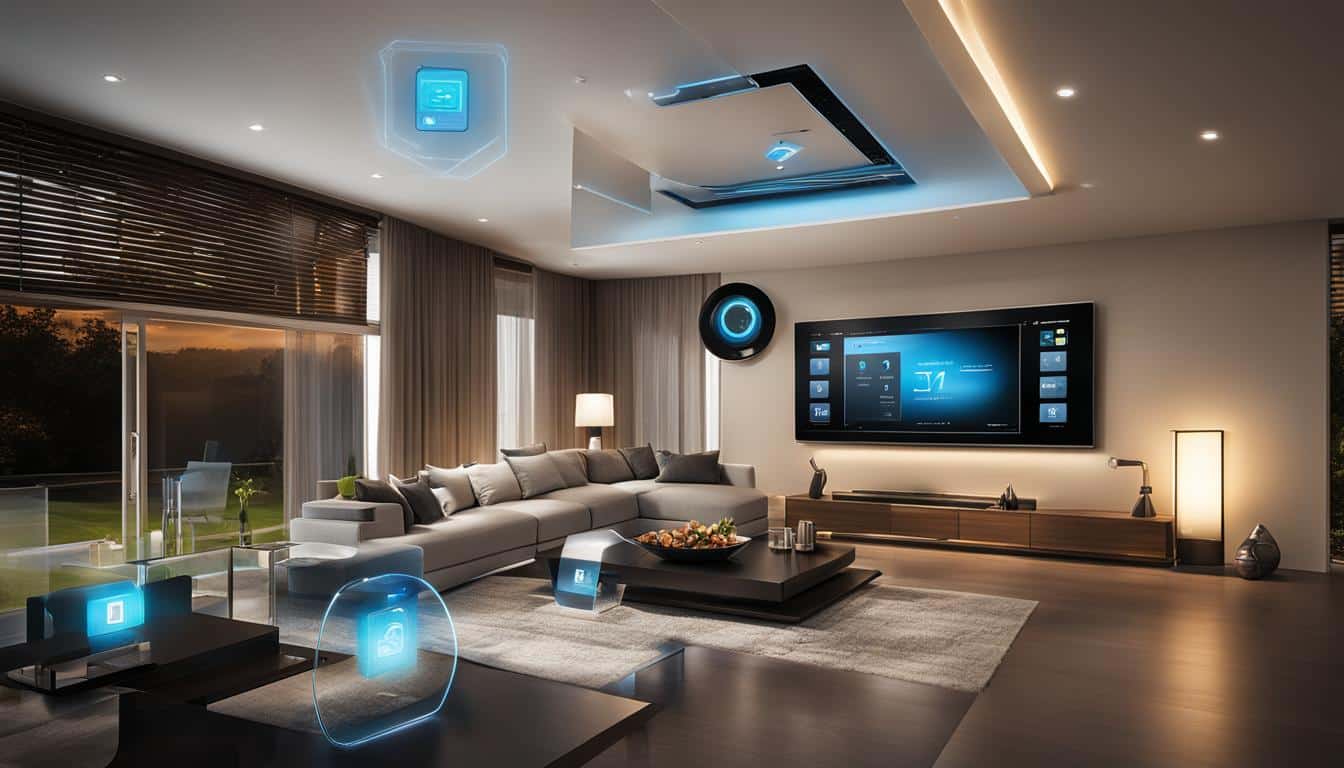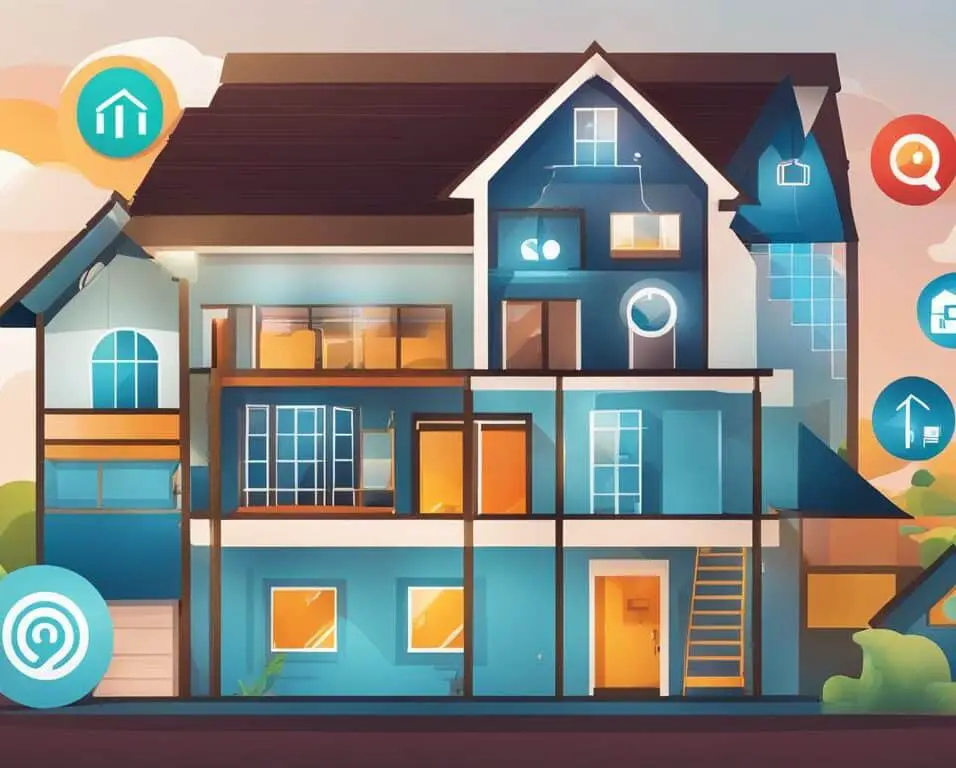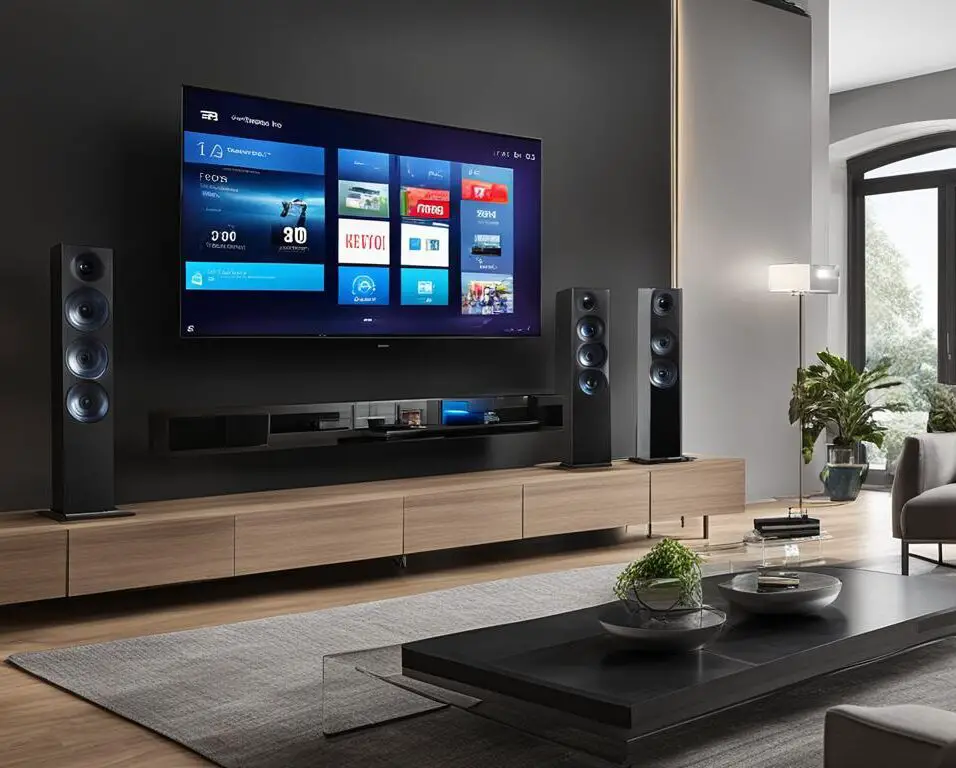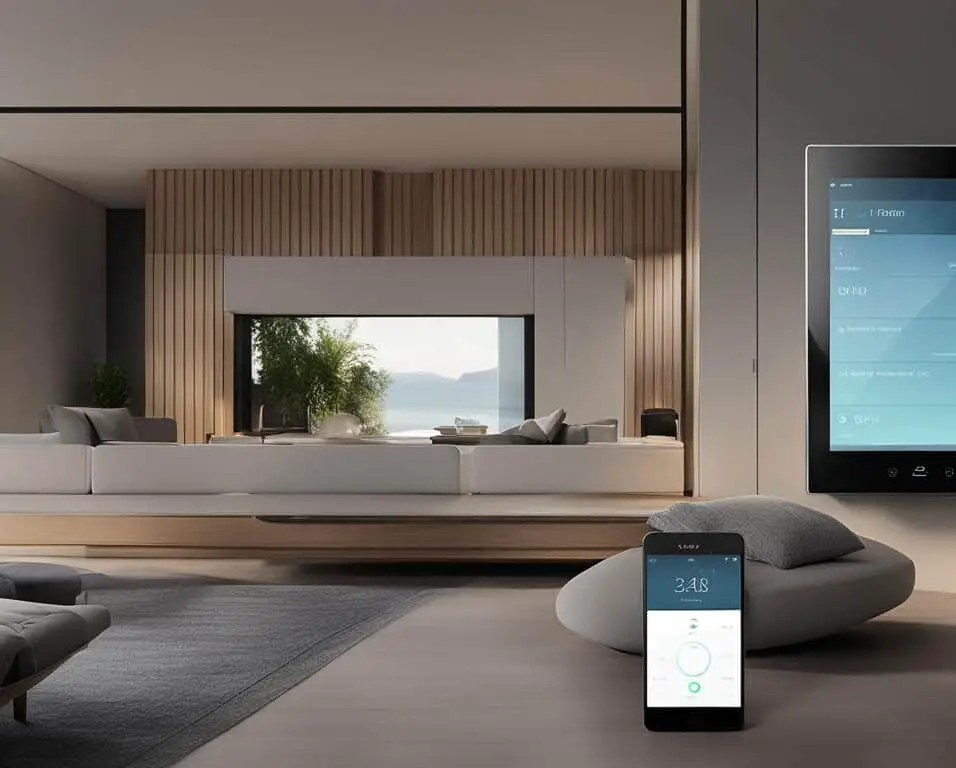Remote Home Management with Smart Technology
A smart home is a residence that utilizes internet-connected devices to enable the remote monitoring and management of appliances and systems. By incorporating smart home automation, homeowners can enjoy the benefits of remote access control, energy efficiency, and convenience. With the help of a home management app, smart security systems, and remote home monitoring, homeowners can easily control and monitor their homes from anywhere.
Key Takeaways
- Remote Smart Home Management allows homeowners to control and monitor their homes from anywhere using smart technology.
- Smart home automation offers convenience, energy efficiency, and increased security.
- A home management app provides homeowners with the ability to control appliances, security systems, and more.
- Remote home monitoring allows homeowners to keep an eye on their homes and loved ones when they are away.
- Integrating smart technology into homes offers numerous benefits, but also comes with challenges such as the need for a reliable internet connection and concerns about security and data privacy.
Benefits of Remote Smart Home Management
Remote Smart Home Management offers numerous advantages for homeowners looking to embrace the power of smart home automation. With the ability to control and monitor their homes remotely, homeowners gain a sense of assurance and peace of mind. They can easily check if appliances are left on or doors are unlocked, and take necessary action to prevent any potential dangers.
One of the key benefits of Remote Smart Home Management is the convenience it offers. Users can program their smart devices to perform specific actions upon their arrival or departure, enhancing their overall comfort and saving time. For example, they can set their smart thermostats to adjust the temperature as they approach home or turn on the lights in anticipation of their arrival.
Another significant advantage is the ability to remotely monitor the health and well-being of family members, particularly seniors. Remote Smart Home Management allows homeowners to keep a close eye on their loved ones, receive notifications about any emergencies, and ensure their safety even when they are away from home.
Remote Smart Home Management improves efficiency by learning homeowner behaviors and adjusting settings accordingly, saving energy and resources.
Moreover, Remote Smart Home Management promotes energy efficiency. By learning homeowner behaviors and analyzing usage patterns, smart homes can adjust settings automatically to optimize energy consumption. For example, smart thermostats can adjust temperature settings based on occupancy, resulting in energy savings and reduced utility bills.
While Remote Smart Home Management offers a range of benefits, it is important to consider some potential disadvantages. Homeowners need a reliable internet connection for seamless remote access and control. Additionally, the perceived complexity of smart home systems may deter some individuals from fully embracing the technology. Data privacy and security concerns are also important factors to address when implementing Remote Smart Home Management to ensure the protection of personal information.
Despite these considerations, the advantages of Remote Smart Home Management outweigh the challenges. Homeowners can enjoy increased security, convenience, and energy efficiency by harnessing the power of smart home technology and taking control of their homes from anywhere.
Setting up a Remote Smart Home
Setting up a Remote Smart Home is a seamless process that can be done in both newly built homes and older homes. There are several home automation communications protocols available, but two common options are Zigbee and Z-Wave. These protocols allow for the seamless integration and communication between various smart devices in the home.
The Control4 Smart Home Platform is an excellent choice for managing and monitoring a Remote Smart Home. This platform offers a complete solution for millions of households, allowing service providers to introduce their own Smart Home Service to subscribers. With Control4, homeowners can have a coherent and holistic view and control of all devices in their Smart Home, including appliances, security sensors, cameras, and power management.
Another option to consider is the Friendly Smart Home Platform. It offers a comprehensive solution for device management, video management, power management, and more. This platform can be easily accessed and managed remotely from a PC, tablet, or smartphone, providing homeowners with convenient control over their entire smart home system.
| Comparison of Control4 and Friendly Smart Home Platforms | Control4 | Friendly Smart Home |
|---|---|---|
| Device Management | Provides a coherent and holistic view of all devices | Offers comprehensive device management capabilities |
| Video Management | Integrates with security cameras for remote monitoring | Includes video management features for enhanced security |
| Power Management | Enables control and monitoring of power usage | Offers power management capabilities for energy efficiency |
| Remote Access | Allows homeowners to access and control their smart home remotely | Enables remote management from PC, tablet, or smartphone |
Whether homeowners choose to go with the Control4 platform or the Friendly Smart Home platform, both options provide a robust and user-friendly solution for setting up a Remote Smart Home. With these platforms, homeowners can enjoy the convenience, security, and energy efficiency of smart home automation, all controlled from the palm of their hand.
Conclusion
Remote Smart Home Management offers homeowners the convenience, comfort, and peace of mind of being able to control and monitor their homes remotely. With the advancements in smart home technology, homeowners can now easily manage all aspects of their homes using a single smart home app on their smartphone or another networked device.
The benefits of Remote Smart Home Management include increased security, energy efficiency, and convenience. By integrating smart security systems, homeowners can have peace of mind that their homes are always protected. The ability to remotely access and control devices like thermostats and lighting systems enhances energy efficiency and reduces utility bills. Additionally, the convenience of programming devices to perform specific actions based on user preferences adds a new level of comfort to everyday life.
However, it is important to consider some challenges associated with Remote Smart Home Management. A reliable internet connection is necessary to maintain seamless communication between the smart home devices and the control app. Homeowners may also find smart home systems complex to set up and manage, requiring technical expertise or professional assistance. Lastly, concerns about security and data privacy are valid, and homeowners should take necessary precautions to protect their personal information.
Despite these challenges, the demand for Remote Smart Home Management continues to grow as more homeowners recognize the advantages of integrating smart technology into their homes. With the ability to remotely monitor and control their homes, homeowners can have a greater sense of control and convenience, making their lives easier and more efficient.
FAQ
What is a smart home?
A smart home is a residence that uses internet-connected devices to enable the remote monitoring and management of appliances and systems.
How does smart home technology work?
Smart home technology works by using a master home automation controller, often called a smart home hub, that controls all devices and combines them into a single smart home app.
What are some examples of smart home technologies?
Examples of smart home technologies include smart TVs, lighting systems, thermostats, door locks, security cameras, and kitchen appliances.
What are the advantages of remote smart home management?
Remote smart home management provides homeowners with assurance, convenience, peace of mind, and improved efficiency through remote monitoring and control of their homes.
Can a remote smart home be set up in older homes?
Yes, remote smart home systems can be set up in both newly built homes and older homes using home automation communications protocols like Zigbee and Z-Wave.
What are some options for remote smart home management platforms?
The Control4 Smart Home Platform and the Friendly Smart Home Platform are two options that offer complete solutions for remote device management and control.
What are the challenges of remote smart home management?
Challenges include the need for a reliable internet connection, the complexity of some smart home systems, and concerns about security and data privacy.
What are the benefits of remote smart home management?
The benefits include increased security, energy efficiency, and convenience for homeowners.
Why is remote smart home management in high demand?
Homeowners recognize the advantages of integrating smart technology into their homes, leading to an increased demand for remote smart home management solutions.








